Holmes Institute HI6028: Taxation Law Assignment - T1 2019
VerifiedAdded on 2023/03/17
|9
|2371
|45
Homework Assignment
AI Summary
This assignment solution addresses three key taxation law scenarios. The first question analyzes the capital gains tax (CGT) implications of Helen's transactions involving antique items, considering the acquisition dates and the $500 and $10,000 thresholds for collectibles and personal-use assets. The second question examines whether Barbara's income from writing a book constitutes income from personal exertion, analyzing the application of the Income Tax Assessment Act 1936 and the treatment of copyright. The third question focuses on Patrick's loan to his son, determining whether the repayment, including an additional amount, is considered assessable income, referencing relevant case law to support the analysis. The solution provides detailed explanations and legal references for each scenario, demonstrating a strong understanding of Australian taxation principles.
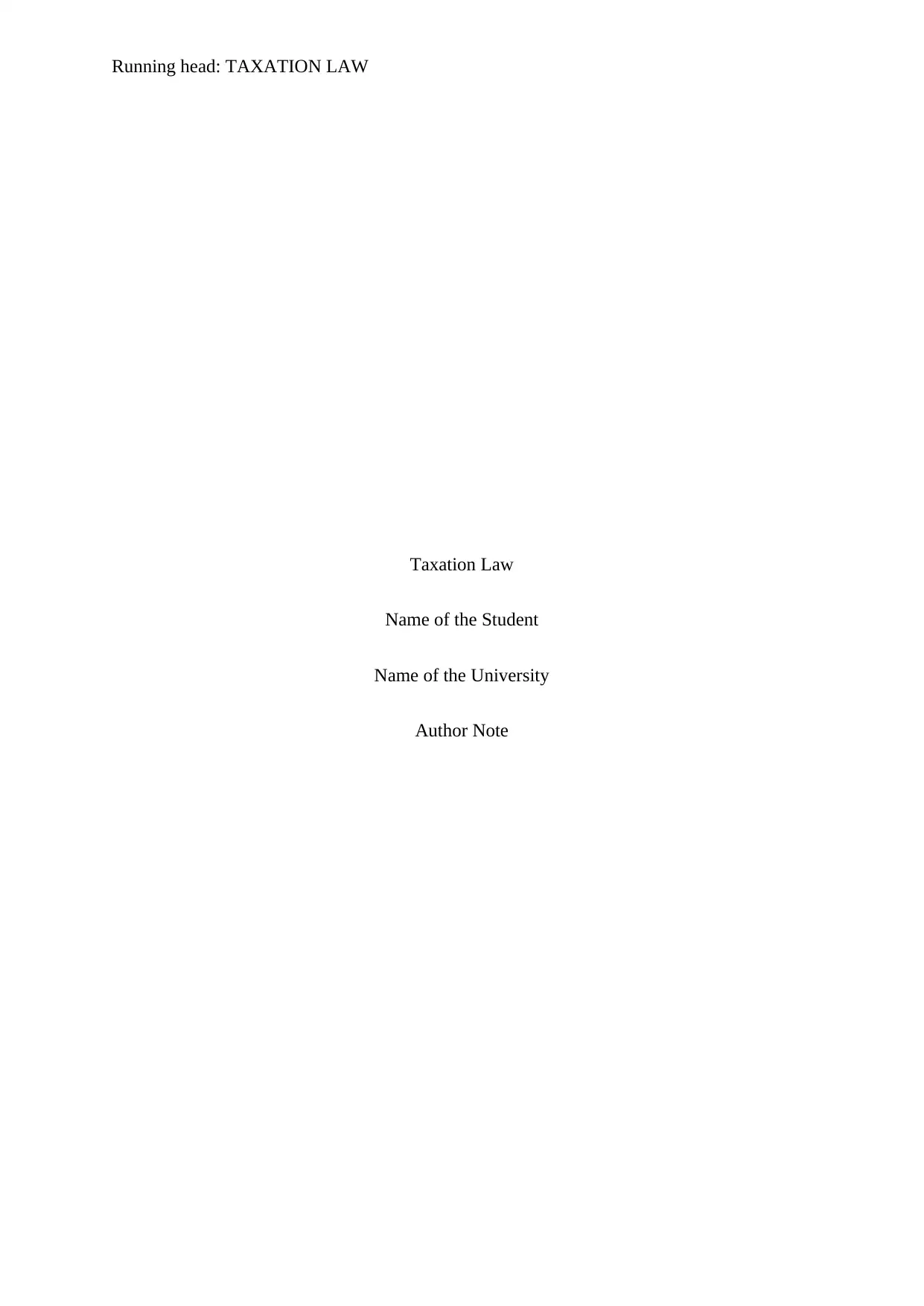
Running head: TAXATION LAW
Taxation Law
Name of the Student
Name of the University
Author Note
Taxation Law
Name of the Student
Name of the University
Author Note
Paraphrase This Document
Need a fresh take? Get an instant paraphrase of this document with our AI Paraphraser
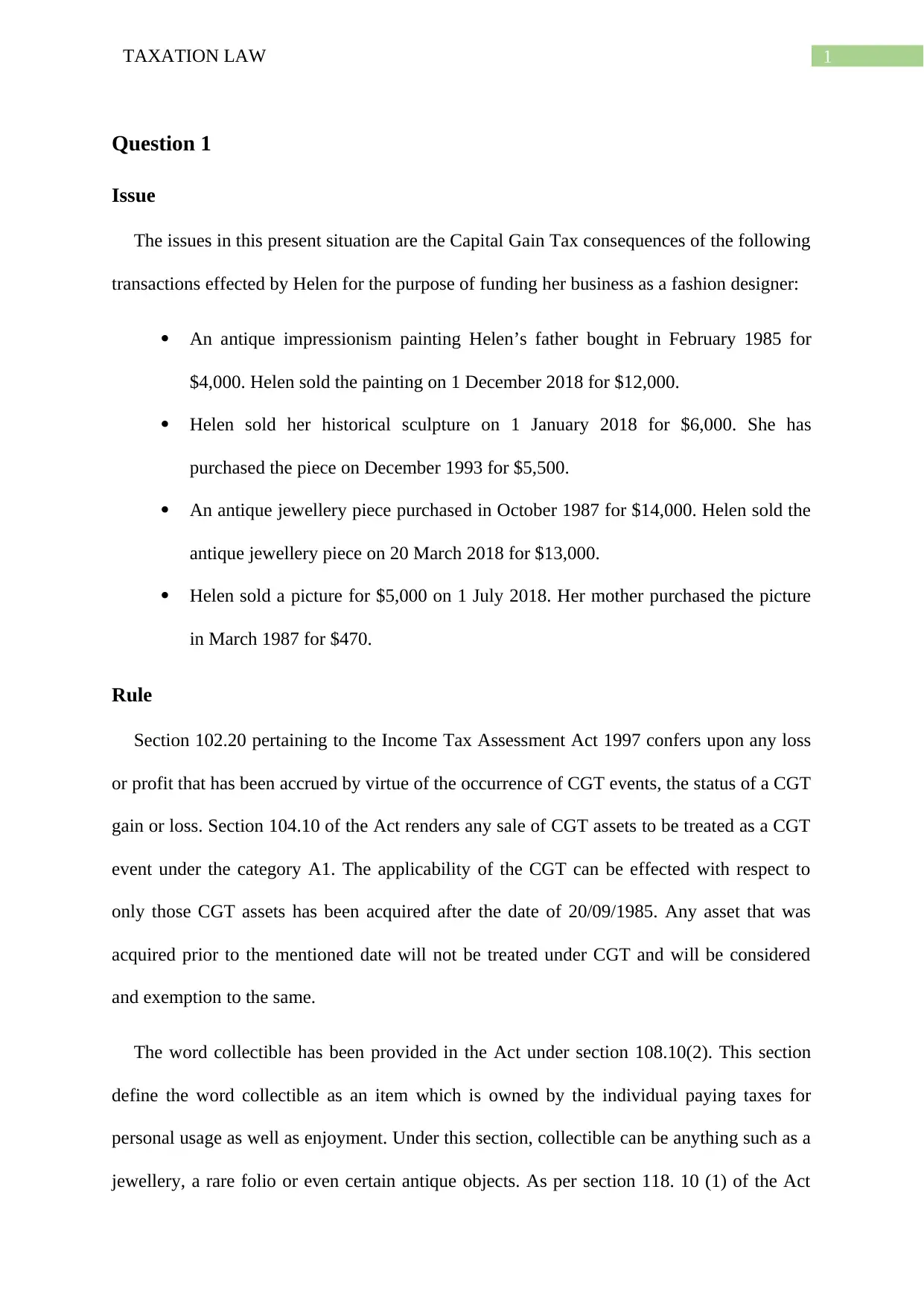
1TAXATION LAW
Question 1
Issue
The issues in this present situation are the Capital Gain Tax consequences of the following
transactions effected by Helen for the purpose of funding her business as a fashion designer:
An antique impressionism painting Helen’s father bought in February 1985 for
$4,000. Helen sold the painting on 1 December 2018 for $12,000.
Helen sold her historical sculpture on 1 January 2018 for $6,000. She has
purchased the piece on December 1993 for $5,500.
An antique jewellery piece purchased in October 1987 for $14,000. Helen sold the
antique jewellery piece on 20 March 2018 for $13,000.
Helen sold a picture for $5,000 on 1 July 2018. Her mother purchased the picture
in March 1987 for $470.
Rule
Section 102.20 pertaining to the Income Tax Assessment Act 1997 confers upon any loss
or profit that has been accrued by virtue of the occurrence of CGT events, the status of a CGT
gain or loss. Section 104.10 of the Act renders any sale of CGT assets to be treated as a CGT
event under the category A1. The applicability of the CGT can be effected with respect to
only those CGT assets has been acquired after the date of 20/09/1985. Any asset that was
acquired prior to the mentioned date will not be treated under CGT and will be considered
and exemption to the same.
The word collectible has been provided in the Act under section 108.10(2). This section
define the word collectible as an item which is owned by the individual paying taxes for
personal usage as well as enjoyment. Under this section, collectible can be anything such as a
jewellery, a rare folio or even certain antique objects. As per section 118. 10 (1) of the Act
Question 1
Issue
The issues in this present situation are the Capital Gain Tax consequences of the following
transactions effected by Helen for the purpose of funding her business as a fashion designer:
An antique impressionism painting Helen’s father bought in February 1985 for
$4,000. Helen sold the painting on 1 December 2018 for $12,000.
Helen sold her historical sculpture on 1 January 2018 for $6,000. She has
purchased the piece on December 1993 for $5,500.
An antique jewellery piece purchased in October 1987 for $14,000. Helen sold the
antique jewellery piece on 20 March 2018 for $13,000.
Helen sold a picture for $5,000 on 1 July 2018. Her mother purchased the picture
in March 1987 for $470.
Rule
Section 102.20 pertaining to the Income Tax Assessment Act 1997 confers upon any loss
or profit that has been accrued by virtue of the occurrence of CGT events, the status of a CGT
gain or loss. Section 104.10 of the Act renders any sale of CGT assets to be treated as a CGT
event under the category A1. The applicability of the CGT can be effected with respect to
only those CGT assets has been acquired after the date of 20/09/1985. Any asset that was
acquired prior to the mentioned date will not be treated under CGT and will be considered
and exemption to the same.
The word collectible has been provided in the Act under section 108.10(2). This section
define the word collectible as an item which is owned by the individual paying taxes for
personal usage as well as enjoyment. Under this section, collectible can be anything such as a
jewellery, a rare folio or even certain antique objects. As per section 118. 10 (1) of the Act
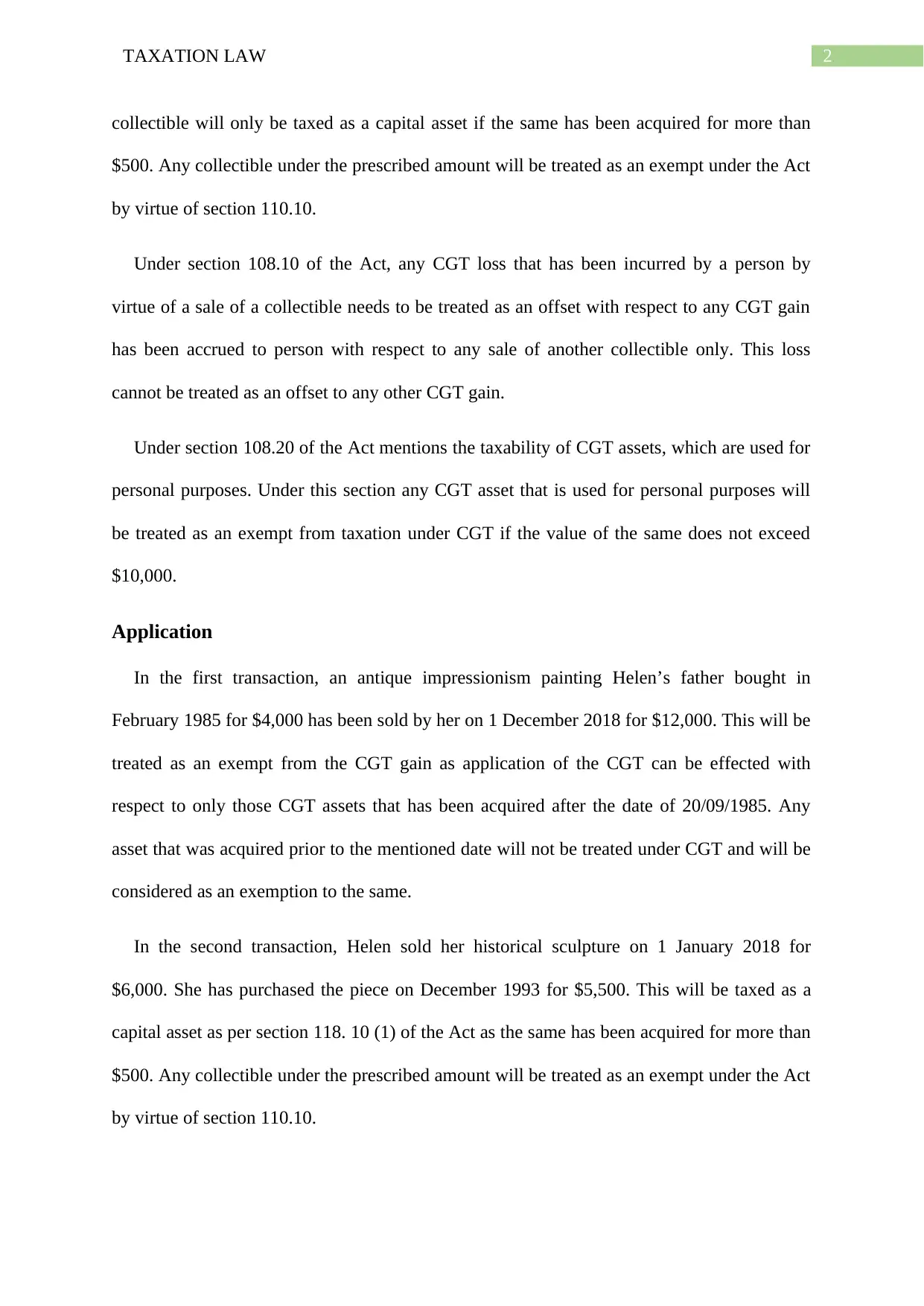
2TAXATION LAW
collectible will only be taxed as a capital asset if the same has been acquired for more than
$500. Any collectible under the prescribed amount will be treated as an exempt under the Act
by virtue of section 110.10.
Under section 108.10 of the Act, any CGT loss that has been incurred by a person by
virtue of a sale of a collectible needs to be treated as an offset with respect to any CGT gain
has been accrued to person with respect to any sale of another collectible only. This loss
cannot be treated as an offset to any other CGT gain.
Under section 108.20 of the Act mentions the taxability of CGT assets, which are used for
personal purposes. Under this section any CGT asset that is used for personal purposes will
be treated as an exempt from taxation under CGT if the value of the same does not exceed
$10,000.
Application
In the first transaction, an antique impressionism painting Helen’s father bought in
February 1985 for $4,000 has been sold by her on 1 December 2018 for $12,000. This will be
treated as an exempt from the CGT gain as application of the CGT can be effected with
respect to only those CGT assets that has been acquired after the date of 20/09/1985. Any
asset that was acquired prior to the mentioned date will not be treated under CGT and will be
considered as an exemption to the same.
In the second transaction, Helen sold her historical sculpture on 1 January 2018 for
$6,000. She has purchased the piece on December 1993 for $5,500. This will be taxed as a
capital asset as per section 118. 10 (1) of the Act as the same has been acquired for more than
$500. Any collectible under the prescribed amount will be treated as an exempt under the Act
by virtue of section 110.10.
collectible will only be taxed as a capital asset if the same has been acquired for more than
$500. Any collectible under the prescribed amount will be treated as an exempt under the Act
by virtue of section 110.10.
Under section 108.10 of the Act, any CGT loss that has been incurred by a person by
virtue of a sale of a collectible needs to be treated as an offset with respect to any CGT gain
has been accrued to person with respect to any sale of another collectible only. This loss
cannot be treated as an offset to any other CGT gain.
Under section 108.20 of the Act mentions the taxability of CGT assets, which are used for
personal purposes. Under this section any CGT asset that is used for personal purposes will
be treated as an exempt from taxation under CGT if the value of the same does not exceed
$10,000.
Application
In the first transaction, an antique impressionism painting Helen’s father bought in
February 1985 for $4,000 has been sold by her on 1 December 2018 for $12,000. This will be
treated as an exempt from the CGT gain as application of the CGT can be effected with
respect to only those CGT assets that has been acquired after the date of 20/09/1985. Any
asset that was acquired prior to the mentioned date will not be treated under CGT and will be
considered as an exemption to the same.
In the second transaction, Helen sold her historical sculpture on 1 January 2018 for
$6,000. She has purchased the piece on December 1993 for $5,500. This will be taxed as a
capital asset as per section 118. 10 (1) of the Act as the same has been acquired for more than
$500. Any collectible under the prescribed amount will be treated as an exempt under the Act
by virtue of section 110.10.
⊘ This is a preview!⊘
Do you want full access?
Subscribe today to unlock all pages.

Trusted by 1+ million students worldwide
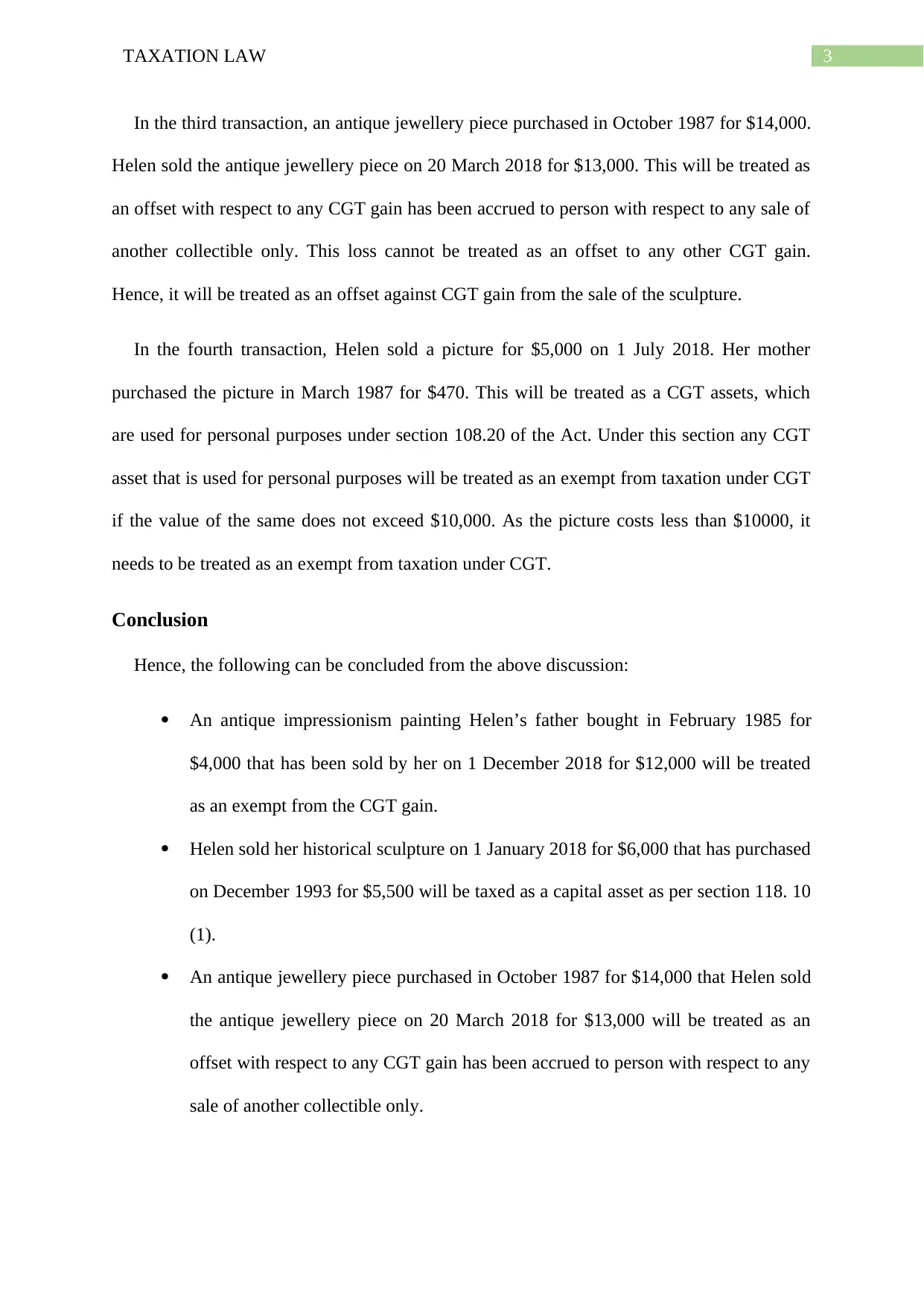
3TAXATION LAW
In the third transaction, an antique jewellery piece purchased in October 1987 for $14,000.
Helen sold the antique jewellery piece on 20 March 2018 for $13,000. This will be treated as
an offset with respect to any CGT gain has been accrued to person with respect to any sale of
another collectible only. This loss cannot be treated as an offset to any other CGT gain.
Hence, it will be treated as an offset against CGT gain from the sale of the sculpture.
In the fourth transaction, Helen sold a picture for $5,000 on 1 July 2018. Her mother
purchased the picture in March 1987 for $470. This will be treated as a CGT assets, which
are used for personal purposes under section 108.20 of the Act. Under this section any CGT
asset that is used for personal purposes will be treated as an exempt from taxation under CGT
if the value of the same does not exceed $10,000. As the picture costs less than $10000, it
needs to be treated as an exempt from taxation under CGT.
Conclusion
Hence, the following can be concluded from the above discussion:
An antique impressionism painting Helen’s father bought in February 1985 for
$4,000 that has been sold by her on 1 December 2018 for $12,000 will be treated
as an exempt from the CGT gain.
Helen sold her historical sculpture on 1 January 2018 for $6,000 that has purchased
on December 1993 for $5,500 will be taxed as a capital asset as per section 118. 10
(1).
An antique jewellery piece purchased in October 1987 for $14,000 that Helen sold
the antique jewellery piece on 20 March 2018 for $13,000 will be treated as an
offset with respect to any CGT gain has been accrued to person with respect to any
sale of another collectible only.
In the third transaction, an antique jewellery piece purchased in October 1987 for $14,000.
Helen sold the antique jewellery piece on 20 March 2018 for $13,000. This will be treated as
an offset with respect to any CGT gain has been accrued to person with respect to any sale of
another collectible only. This loss cannot be treated as an offset to any other CGT gain.
Hence, it will be treated as an offset against CGT gain from the sale of the sculpture.
In the fourth transaction, Helen sold a picture for $5,000 on 1 July 2018. Her mother
purchased the picture in March 1987 for $470. This will be treated as a CGT assets, which
are used for personal purposes under section 108.20 of the Act. Under this section any CGT
asset that is used for personal purposes will be treated as an exempt from taxation under CGT
if the value of the same does not exceed $10,000. As the picture costs less than $10000, it
needs to be treated as an exempt from taxation under CGT.
Conclusion
Hence, the following can be concluded from the above discussion:
An antique impressionism painting Helen’s father bought in February 1985 for
$4,000 that has been sold by her on 1 December 2018 for $12,000 will be treated
as an exempt from the CGT gain.
Helen sold her historical sculpture on 1 January 2018 for $6,000 that has purchased
on December 1993 for $5,500 will be taxed as a capital asset as per section 118. 10
(1).
An antique jewellery piece purchased in October 1987 for $14,000 that Helen sold
the antique jewellery piece on 20 March 2018 for $13,000 will be treated as an
offset with respect to any CGT gain has been accrued to person with respect to any
sale of another collectible only.
Paraphrase This Document
Need a fresh take? Get an instant paraphrase of this document with our AI Paraphraser
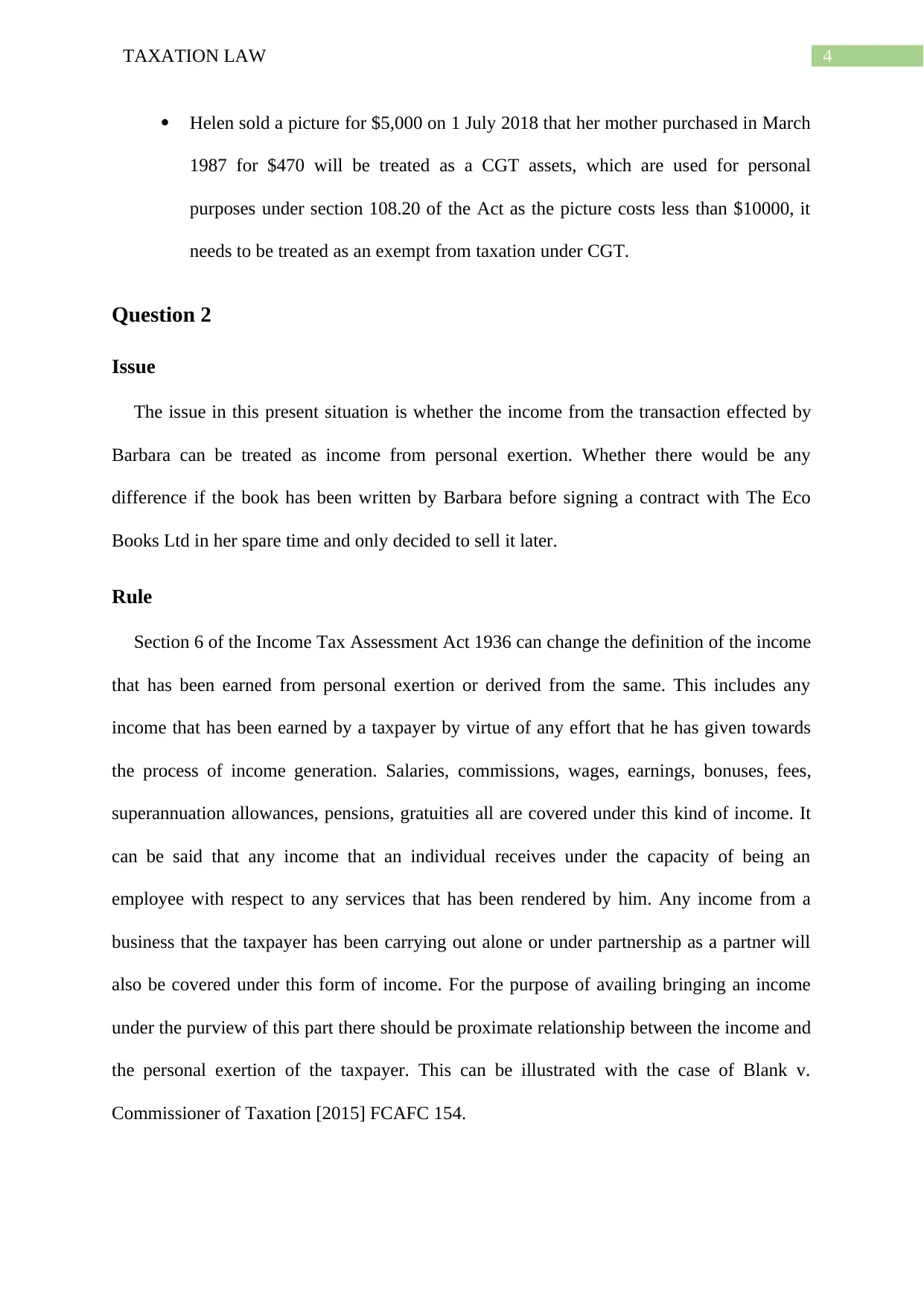
4TAXATION LAW
Helen sold a picture for $5,000 on 1 July 2018 that her mother purchased in March
1987 for $470 will be treated as a CGT assets, which are used for personal
purposes under section 108.20 of the Act as the picture costs less than $10000, it
needs to be treated as an exempt from taxation under CGT.
Question 2
Issue
The issue in this present situation is whether the income from the transaction effected by
Barbara can be treated as income from personal exertion. Whether there would be any
difference if the book has been written by Barbara before signing a contract with The Eco
Books Ltd in her spare time and only decided to sell it later.
Rule
Section 6 of the Income Tax Assessment Act 1936 can change the definition of the income
that has been earned from personal exertion or derived from the same. This includes any
income that has been earned by a taxpayer by virtue of any effort that he has given towards
the process of income generation. Salaries, commissions, wages, earnings, bonuses, fees,
superannuation allowances, pensions, gratuities all are covered under this kind of income. It
can be said that any income that an individual receives under the capacity of being an
employee with respect to any services that has been rendered by him. Any income from a
business that the taxpayer has been carrying out alone or under partnership as a partner will
also be covered under this form of income. For the purpose of availing bringing an income
under the purview of this part there should be proximate relationship between the income and
the personal exertion of the taxpayer. This can be illustrated with the case of Blank v.
Commissioner of Taxation [2015] FCAFC 154.
Helen sold a picture for $5,000 on 1 July 2018 that her mother purchased in March
1987 for $470 will be treated as a CGT assets, which are used for personal
purposes under section 108.20 of the Act as the picture costs less than $10000, it
needs to be treated as an exempt from taxation under CGT.
Question 2
Issue
The issue in this present situation is whether the income from the transaction effected by
Barbara can be treated as income from personal exertion. Whether there would be any
difference if the book has been written by Barbara before signing a contract with The Eco
Books Ltd in her spare time and only decided to sell it later.
Rule
Section 6 of the Income Tax Assessment Act 1936 can change the definition of the income
that has been earned from personal exertion or derived from the same. This includes any
income that has been earned by a taxpayer by virtue of any effort that he has given towards
the process of income generation. Salaries, commissions, wages, earnings, bonuses, fees,
superannuation allowances, pensions, gratuities all are covered under this kind of income. It
can be said that any income that an individual receives under the capacity of being an
employee with respect to any services that has been rendered by him. Any income from a
business that the taxpayer has been carrying out alone or under partnership as a partner will
also be covered under this form of income. For the purpose of availing bringing an income
under the purview of this part there should be proximate relationship between the income and
the personal exertion of the taxpayer. This can be illustrated with the case of Blank v.
Commissioner of Taxation [2015] FCAFC 154.
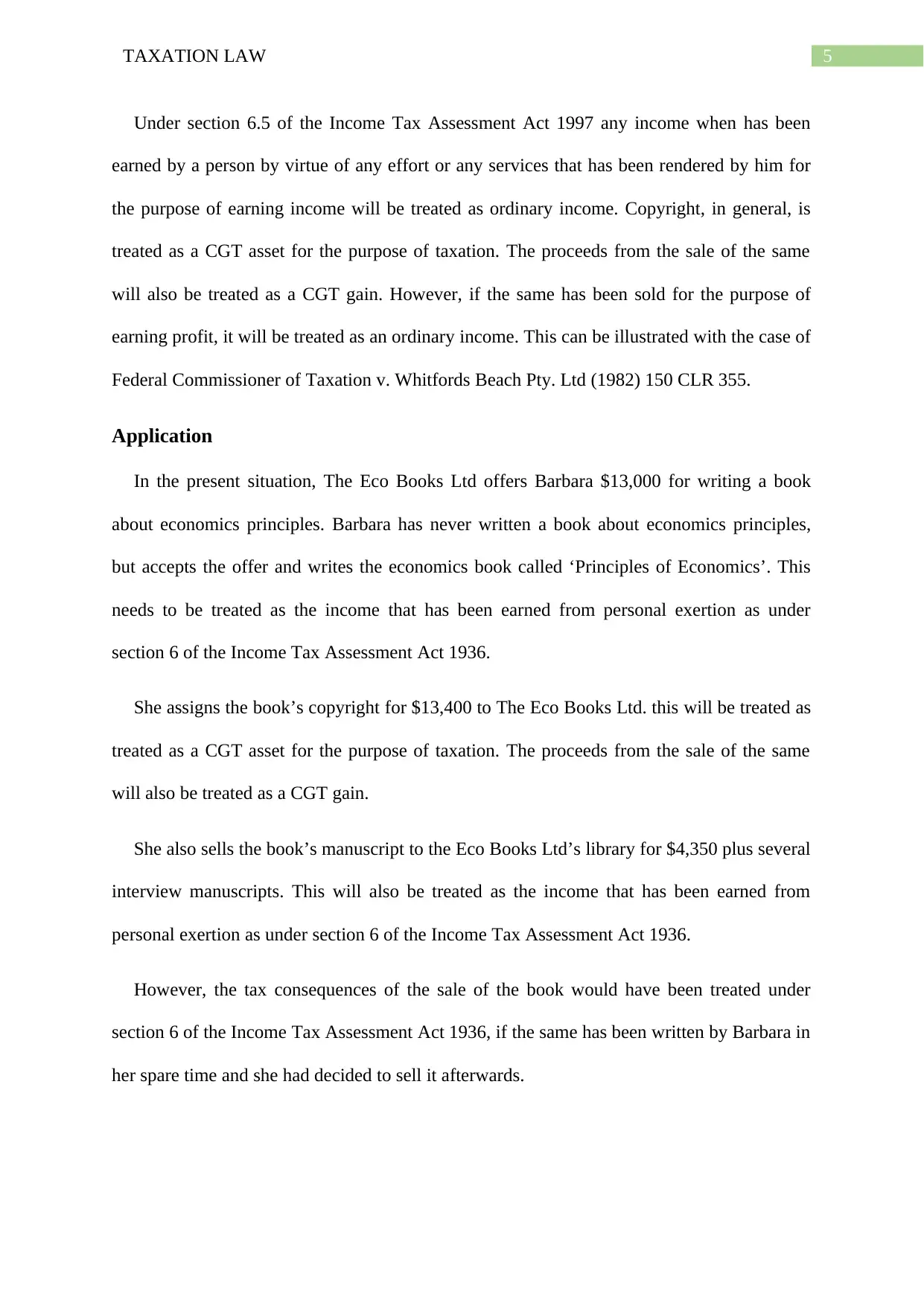
5TAXATION LAW
Under section 6.5 of the Income Tax Assessment Act 1997 any income when has been
earned by a person by virtue of any effort or any services that has been rendered by him for
the purpose of earning income will be treated as ordinary income. Copyright, in general, is
treated as a CGT asset for the purpose of taxation. The proceeds from the sale of the same
will also be treated as a CGT gain. However, if the same has been sold for the purpose of
earning profit, it will be treated as an ordinary income. This can be illustrated with the case of
Federal Commissioner of Taxation v. Whitfords Beach Pty. Ltd (1982) 150 CLR 355.
Application
In the present situation, The Eco Books Ltd offers Barbara $13,000 for writing a book
about economics principles. Barbara has never written a book about economics principles,
but accepts the offer and writes the economics book called ‘Principles of Economics’. This
needs to be treated as the income that has been earned from personal exertion as under
section 6 of the Income Tax Assessment Act 1936.
She assigns the book’s copyright for $13,400 to The Eco Books Ltd. this will be treated as
treated as a CGT asset for the purpose of taxation. The proceeds from the sale of the same
will also be treated as a CGT gain.
She also sells the book’s manuscript to the Eco Books Ltd’s library for $4,350 plus several
interview manuscripts. This will also be treated as the income that has been earned from
personal exertion as under section 6 of the Income Tax Assessment Act 1936.
However, the tax consequences of the sale of the book would have been treated under
section 6 of the Income Tax Assessment Act 1936, if the same has been written by Barbara in
her spare time and she had decided to sell it afterwards.
Under section 6.5 of the Income Tax Assessment Act 1997 any income when has been
earned by a person by virtue of any effort or any services that has been rendered by him for
the purpose of earning income will be treated as ordinary income. Copyright, in general, is
treated as a CGT asset for the purpose of taxation. The proceeds from the sale of the same
will also be treated as a CGT gain. However, if the same has been sold for the purpose of
earning profit, it will be treated as an ordinary income. This can be illustrated with the case of
Federal Commissioner of Taxation v. Whitfords Beach Pty. Ltd (1982) 150 CLR 355.
Application
In the present situation, The Eco Books Ltd offers Barbara $13,000 for writing a book
about economics principles. Barbara has never written a book about economics principles,
but accepts the offer and writes the economics book called ‘Principles of Economics’. This
needs to be treated as the income that has been earned from personal exertion as under
section 6 of the Income Tax Assessment Act 1936.
She assigns the book’s copyright for $13,400 to The Eco Books Ltd. this will be treated as
treated as a CGT asset for the purpose of taxation. The proceeds from the sale of the same
will also be treated as a CGT gain.
She also sells the book’s manuscript to the Eco Books Ltd’s library for $4,350 plus several
interview manuscripts. This will also be treated as the income that has been earned from
personal exertion as under section 6 of the Income Tax Assessment Act 1936.
However, the tax consequences of the sale of the book would have been treated under
section 6 of the Income Tax Assessment Act 1936, if the same has been written by Barbara in
her spare time and she had decided to sell it afterwards.
⊘ This is a preview!⊘
Do you want full access?
Subscribe today to unlock all pages.

Trusted by 1+ million students worldwide
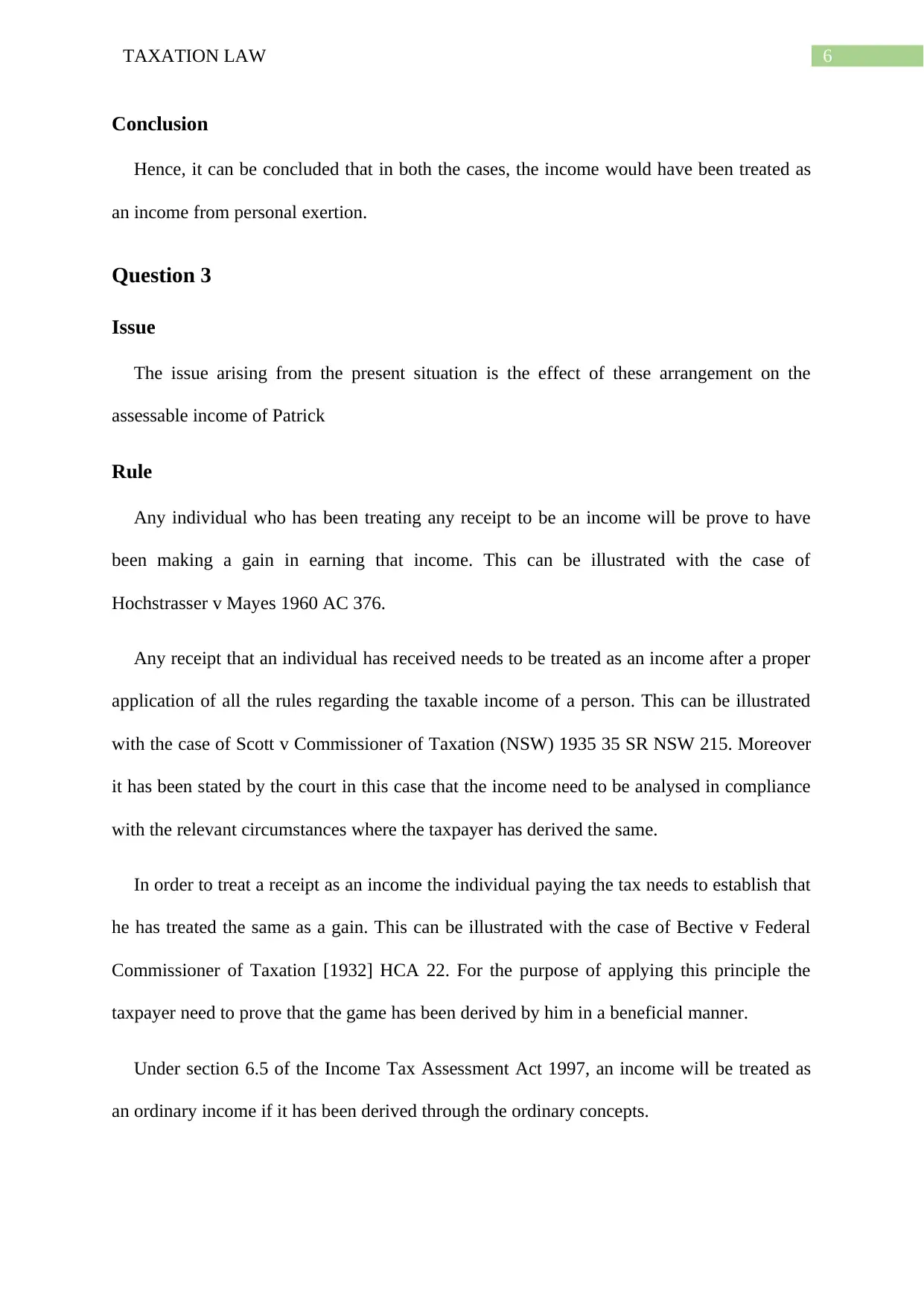
6TAXATION LAW
Conclusion
Hence, it can be concluded that in both the cases, the income would have been treated as
an income from personal exertion.
Question 3
Issue
The issue arising from the present situation is the effect of these arrangement on the
assessable income of Patrick
Rule
Any individual who has been treating any receipt to be an income will be prove to have
been making a gain in earning that income. This can be illustrated with the case of
Hochstrasser v Mayes 1960 AC 376.
Any receipt that an individual has received needs to be treated as an income after a proper
application of all the rules regarding the taxable income of a person. This can be illustrated
with the case of Scott v Commissioner of Taxation (NSW) 1935 35 SR NSW 215. Moreover
it has been stated by the court in this case that the income need to be analysed in compliance
with the relevant circumstances where the taxpayer has derived the same.
In order to treat a receipt as an income the individual paying the tax needs to establish that
he has treated the same as a gain. This can be illustrated with the case of Bective v Federal
Commissioner of Taxation [1932] HCA 22. For the purpose of applying this principle the
taxpayer need to prove that the game has been derived by him in a beneficial manner.
Under section 6.5 of the Income Tax Assessment Act 1997, an income will be treated as
an ordinary income if it has been derived through the ordinary concepts.
Conclusion
Hence, it can be concluded that in both the cases, the income would have been treated as
an income from personal exertion.
Question 3
Issue
The issue arising from the present situation is the effect of these arrangement on the
assessable income of Patrick
Rule
Any individual who has been treating any receipt to be an income will be prove to have
been making a gain in earning that income. This can be illustrated with the case of
Hochstrasser v Mayes 1960 AC 376.
Any receipt that an individual has received needs to be treated as an income after a proper
application of all the rules regarding the taxable income of a person. This can be illustrated
with the case of Scott v Commissioner of Taxation (NSW) 1935 35 SR NSW 215. Moreover
it has been stated by the court in this case that the income need to be analysed in compliance
with the relevant circumstances where the taxpayer has derived the same.
In order to treat a receipt as an income the individual paying the tax needs to establish that
he has treated the same as a gain. This can be illustrated with the case of Bective v Federal
Commissioner of Taxation [1932] HCA 22. For the purpose of applying this principle the
taxpayer need to prove that the game has been derived by him in a beneficial manner.
Under section 6.5 of the Income Tax Assessment Act 1997, an income will be treated as
an ordinary income if it has been derived through the ordinary concepts.
Paraphrase This Document
Need a fresh take? Get an instant paraphrase of this document with our AI Paraphraser
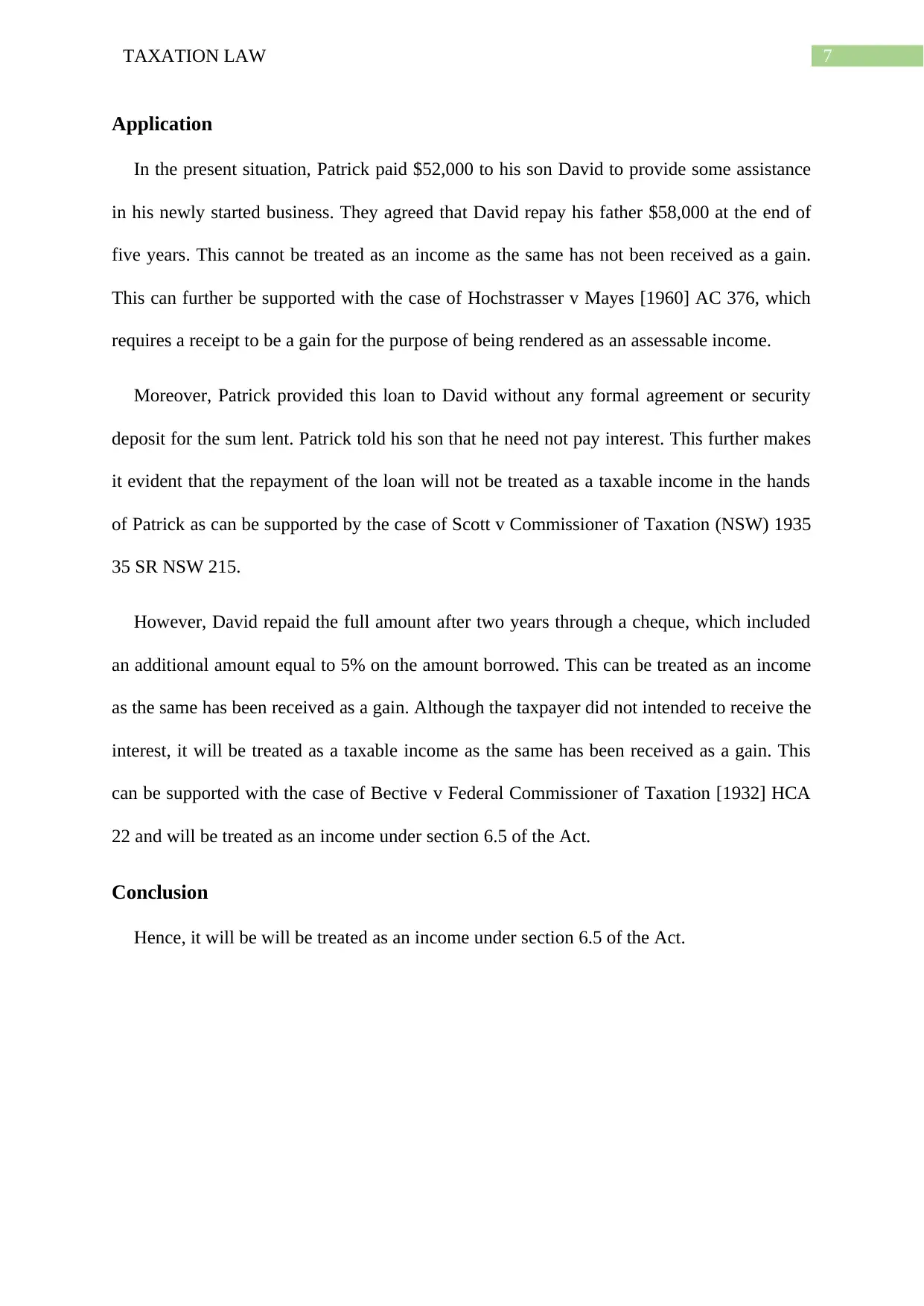
7TAXATION LAW
Application
In the present situation, Patrick paid $52,000 to his son David to provide some assistance
in his newly started business. They agreed that David repay his father $58,000 at the end of
five years. This cannot be treated as an income as the same has not been received as a gain.
This can further be supported with the case of Hochstrasser v Mayes [1960] AC 376, which
requires a receipt to be a gain for the purpose of being rendered as an assessable income.
Moreover, Patrick provided this loan to David without any formal agreement or security
deposit for the sum lent. Patrick told his son that he need not pay interest. This further makes
it evident that the repayment of the loan will not be treated as a taxable income in the hands
of Patrick as can be supported by the case of Scott v Commissioner of Taxation (NSW) 1935
35 SR NSW 215.
However, David repaid the full amount after two years through a cheque, which included
an additional amount equal to 5% on the amount borrowed. This can be treated as an income
as the same has been received as a gain. Although the taxpayer did not intended to receive the
interest, it will be treated as a taxable income as the same has been received as a gain. This
can be supported with the case of Bective v Federal Commissioner of Taxation [1932] HCA
22 and will be treated as an income under section 6.5 of the Act.
Conclusion
Hence, it will be will be treated as an income under section 6.5 of the Act.
Application
In the present situation, Patrick paid $52,000 to his son David to provide some assistance
in his newly started business. They agreed that David repay his father $58,000 at the end of
five years. This cannot be treated as an income as the same has not been received as a gain.
This can further be supported with the case of Hochstrasser v Mayes [1960] AC 376, which
requires a receipt to be a gain for the purpose of being rendered as an assessable income.
Moreover, Patrick provided this loan to David without any formal agreement or security
deposit for the sum lent. Patrick told his son that he need not pay interest. This further makes
it evident that the repayment of the loan will not be treated as a taxable income in the hands
of Patrick as can be supported by the case of Scott v Commissioner of Taxation (NSW) 1935
35 SR NSW 215.
However, David repaid the full amount after two years through a cheque, which included
an additional amount equal to 5% on the amount borrowed. This can be treated as an income
as the same has been received as a gain. Although the taxpayer did not intended to receive the
interest, it will be treated as a taxable income as the same has been received as a gain. This
can be supported with the case of Bective v Federal Commissioner of Taxation [1932] HCA
22 and will be treated as an income under section 6.5 of the Act.
Conclusion
Hence, it will be will be treated as an income under section 6.5 of the Act.
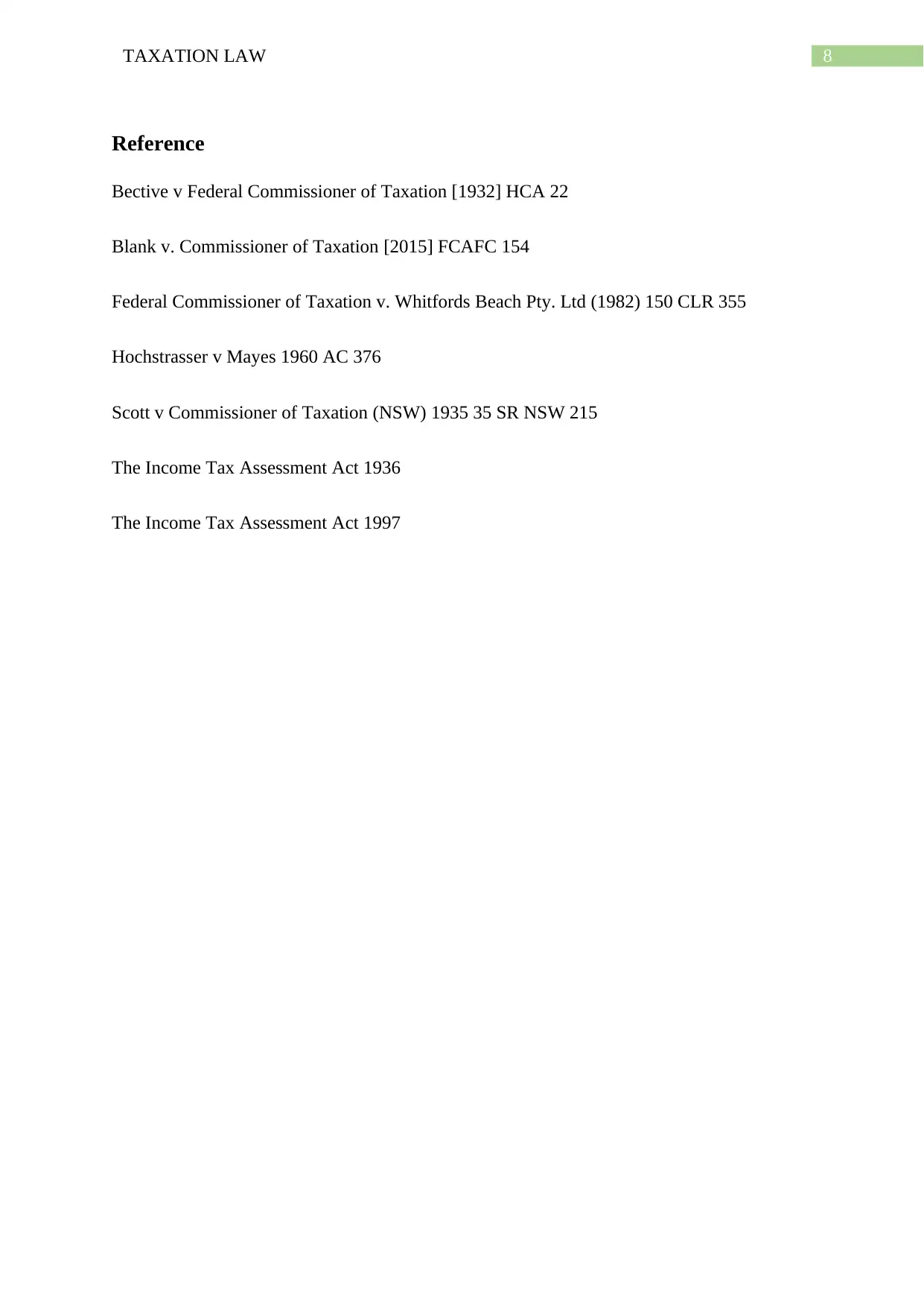
8TAXATION LAW
Reference
Bective v Federal Commissioner of Taxation [1932] HCA 22
Blank v. Commissioner of Taxation [2015] FCAFC 154
Federal Commissioner of Taxation v. Whitfords Beach Pty. Ltd (1982) 150 CLR 355
Hochstrasser v Mayes 1960 AC 376
Scott v Commissioner of Taxation (NSW) 1935 35 SR NSW 215
The Income Tax Assessment Act 1936
The Income Tax Assessment Act 1997
Reference
Bective v Federal Commissioner of Taxation [1932] HCA 22
Blank v. Commissioner of Taxation [2015] FCAFC 154
Federal Commissioner of Taxation v. Whitfords Beach Pty. Ltd (1982) 150 CLR 355
Hochstrasser v Mayes 1960 AC 376
Scott v Commissioner of Taxation (NSW) 1935 35 SR NSW 215
The Income Tax Assessment Act 1936
The Income Tax Assessment Act 1997
⊘ This is a preview!⊘
Do you want full access?
Subscribe today to unlock all pages.

Trusted by 1+ million students worldwide
1 out of 9
Related Documents
Your All-in-One AI-Powered Toolkit for Academic Success.
+13062052269
info@desklib.com
Available 24*7 on WhatsApp / Email
![[object Object]](/_next/static/media/star-bottom.7253800d.svg)
Unlock your academic potential
Copyright © 2020–2026 A2Z Services. All Rights Reserved. Developed and managed by ZUCOL.





